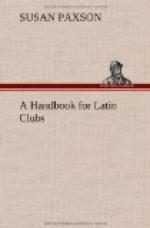IN VERGIL’S ITALY.
Frank Justus Miller. Chautauqua.
Vol. xxxiv, p. 368.
DIDO: A Character Study.
J. Raleigh Nelson. School Review.
Vol. xii, p. 408.
Vergil. Harper and Miller.
VERGIL’S ESTIMATE OF HIS AENEID.
Rome: The Eternal City.
Clara Erskine Clement. Vol. ii, P. 636.
POEM.—The Doom of the Slothful.
John Addington Symonds.
ESSAY.—Paris and Helen.
Adventures among Books. Andrew
Lang. P. 235, or Cosmopolitan.
Vol. xviii, p. 173.
LEGENDS CONNECTED WITH VERGIL.
A History of Roman Literature.
Charles Thomas Cruttwell. P. 278.
VERGIL IN MAINE.
Martha Baker Dunn. Atlantic Monthly.
Vol. c, p. 773.
VERGIL’S INFLUENCE.
On Teaching Vergil. H.H. Yeames.
School Review. Vol. xx, p. 1.
A TRAVESTY ON THE TAKING OF TROY.
Roba di Roma. William W. Story.
P. 186.
North American Review. Vol.
xcvii, p. 255.
ST. PAUL’S VISIT TO VERGIL’S TOMB.
Rome: The Eternal City.
Clara Erskine Clement. Vol. ii, p. 640.
POEM.—To Vergil.
Poetical Works. Alfred Tennyson.
P. 511.
Littell’s Living Age.
Vol. clv, p. 2.
HORACE
“Exegi monumentum acre perennius
regalique situ pyramidum altius.”
—Horace. Carmina.
III, xxx.
HORACE.
Horace: Person and Poet. Grant
Showerman. Classical Journal.
Vol. vi, p. 158.
A History of Roman Literature.
Charles Thomas Cruttwell. P. 515.
A GLIMPSE OF HORACE’S SCHOOLDAYS.
Roman Life in the Days of Cicero.
Alfred J. Church. P. 39.
Readings in Ancient History.
Rome and the West. William Stearns
Davis. P. 227.
POEM.—Capri.
Walter Taylor Field.
AN INVITATION FROM HORACE TO VERGIL FOR DINNER.
Foreign Classics in English.
Vol. iv. William Cleaver Wilkinson.
P. 183.
SOME TRANSLATIONS OF HORACE’S ODES.
Blackwood’s Magazine.
Vol. civ, p. 150.
POEM.—The Sabine Farm.
Michael Monahan. Current Literature.
Vol. xlviii, p. 344.
A DIALOGUE FROM HORACE.—The Bore. Sat.
i, 9.
A Day in Ancient Rome. Edgar
S. Shumway. P. 51.
Masterpieces of Latin Literature.
Gordon J. Laing. P. 295.
POEM.—I sing of myself. (Horace. Book
ii, Ode xx.)
Louis Untermeyer. Century Magazine.
Vol. lxiv, p. 960.
POEM.—Byron’s Farewell to Horace.
Childe Harold. Byron.
Canto iv, lxxvii.
ROMAN LITERATURE
“Haec studia adulescentiam alunt,
senectutem oblectant, secundas res
ornant, adversis perfugium ac solacium
praebent, delectant domi, non
impediunt foris, pernoctant nobiscum,
peregrinantur, rusticantur.”
—Cicero. Pro
Archia Poeta, vii.




